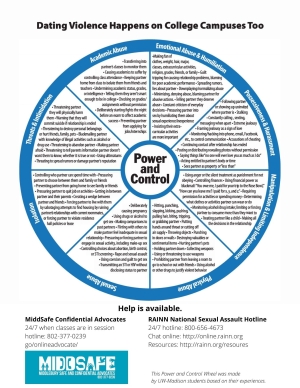MiddSafe Advocates
The MiddSafe Hotline has ended. We thank the callers who entrusted advocates with their experiences for over 10 years. There are many resources available for students or friends of students who have experienced sexual violence, dating violence or stalking.
On Campus Resources for Support and Reporting
- Counseling, (802) 443-5141, counseling@middlebury.edu
- Individual and group counseling appointments
- Health Services, (802) 443-3290, healthservices@middlebury.edu
- Individual medical appointments, sexual assault nurse examinations
- TimelyCare, go/TimelyCare/
- Individual Counseling, In the moment emotional support, medical appointments
- Civil Rights and Title IX Office, crtix@middlebury.edu,
- Reporting sexual violence and accessing supportive measures
- Public Safety, (802) 443-5911
- Reporting concerns and accessing supportive resources
Off Campus Resources for Support and Reporting
- Atria Collective, 1-800-388-4205
- Addison County advocacy agency providing 24/7 support for people who experience power based personal violence
- Middlebury Police Department, 802-388-3191
- Middlebury community police department for reporting
If you are concerned for your own or someone else’s immediate safety, call 911.

MiddSafe Advocate Resources - Power and Control Wheel
Download available here.

